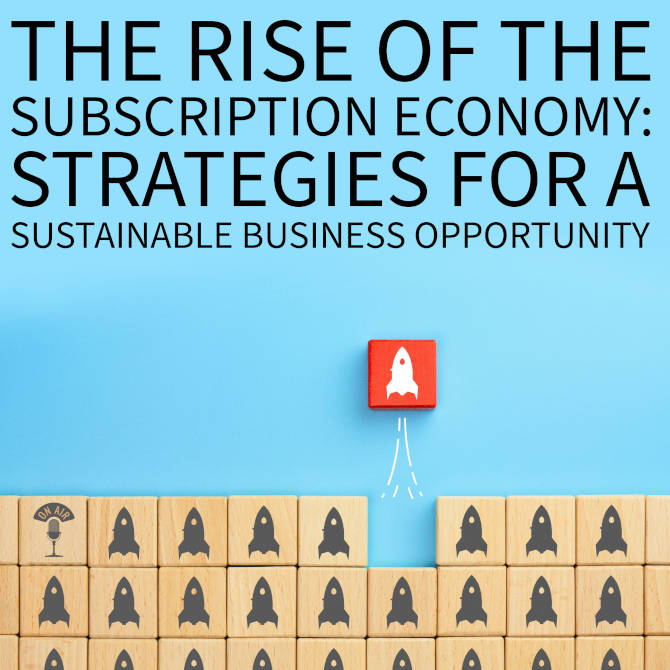Introduction: Addressing Dave’s Big Marketing Question
I think it would be good to start off with an email from one of our listeners, Dave from Cantor Fitzgerald, and he asked me a massive question.
How can marketers adapt to the changing landscape of marketing and incorporate responsible marketing practices into their strategies to differentiate their brands and create value for their customers and communities?
And wow, now that’s one big question.
I suppose it would be easier if I broke this down into three bite-sized chunks. Let’s say the changing landscape of marketing, responsible marketing, and I’ll provide some examples of responsible marketing.
The Changing Landscape of Marketing: Adapting to Modern Consumer Needs
This question really got my brain cells thinking, you know, we’ve discussed before that marketing has undergone significant changes in recent times.
The Shift to Experience-Based Marketing
Due to the rise of modern, the modern consumer who are more discerning, individualistic and demanding in this podcast or episode, we’ll discuss the factors that have contributed to this change and how it affects the marketing strategy. I suppose, you know, the shift from valuing products to how consumers engage with brands is incredibly important.
And we know the modern consumer values experience over just products.
They’re more interested in the overall brand experience, including the company’s values, ethics, and how to engage with customers. This has led to a shift in marketing strategies where marketers need to focus on creating a positive brand experience that aligns with the customer values and preferences.
The Rise of the Intelligent Consumer
This has given rise of the intelligent consumer who does extensive research before making a purchase, you know, there’s access to so much wealth and of information and they use this to make informed purchase decisions. They research product lines online, read reviews and compare prices to ensure they’re getting the best value for their money.
As a result, marketers needs to be transparent about their products and services and provide customers with accurate and relevant information to gain their specific trust.
This would mean that there needs to be a more thoughtful approach to research, interpretation, and decision-making.
Beyond Traditional Marketing: Understanding Complex Consumer Preferences
Over the years, traditional marketing techniques, such as segmentation, are no longer sufficient in understanding modern consumers. They’re too complex and need preferences.
Marketers need to adopt a more thoughtful approach to research and the interpretation, decision-making to gain a deeper understanding of their customers.
They need to focus on identifying non-negotiable essentials, emotional motives, and more rational needs that could be differentiators.
This means that segmentation is becoming increasingly challenging to implement as customers no longer fit into just simple checkboxes.
Customers needs and preferences are highly complex and varied, making it difficult to group them into specific segments.
The High Expectations of Modern Consumers
Marketers need to adopt a more personalised approach that consider each customer’s unique needs and values to succeed in today’s market. I suppose what I’m saying here is modern consumers have higher expectations than in the past, which has made marketing more challenging. It is essential to understand their needs and values as well as the changing landscape of marketing, especially to succeed in this field.
Responsible Marketing: A Critical Component in Today’s Business
We should take an understanding of the importance of responsible marketing and the principles that actually guide it. You know, marketing has significant impact on society and environment. I don’t think anyone can actually argue on that. And responsible marketing is crucial to promote ethical and sustainable practices and drive growth and improve business performance in the long term.
Principles of Responsible Marketing
But what would be the principles of responsible marketing and how they can guide marketing strategies?
Marketers should always prioritise transparency and honesty in their communication with customers. This means avoiding deceptive or misleading claims, disclosing relevant information about products and services, and about being upfront about potential risks or limitations.
Marketers should also be respectful to the customer’s privacy and avoid using data or information in ways that are not explicitly authorized or disclosed.
Incorporating Social and Environmental Responsibility
Businesses have to be aware of social, environmental, and ethical impacts of product services and practices and have this bleed into the marketers so they follow those, those specific ideas.
This means they must take responsibility for any negative consequences, such as environmental pollution, labour abuses, or health risks, and working proactively to mitigate these impacts. I suppose it also means engaging with stakeholders, including customers, employees, and communities to understand their needs and concerns and incorporate their feedback into the business decision.
Creating Value Beyond Profit: The New Marketing Paradigm
Marketers should seek to create value for customer society, rather than maximising profits or market shares.
This means focusing on long term sustainability and creating products and services that are useful, innovative, and socially responsible. It also means supporting social causes such as environmental, conservation, or social justice, and collaborating with other businesses and organisations to achieve a shared goal. By doing so, marketing or marketers can create value for both their customers and their communities and build a loyal customer base.
Responsible marketing requires a more holistic approach that considers the needs and values of their customers, the impact of business practices on society and environment and the long term sustainability of business.
Marketers who embrace this approach can differentiate their brand and create value for both their customers and their communities. Some of us out there may be thinking, well, this is a bit too soon to be looking into this, but as we’ve discussed on other episodes, being innovative and first to the post can actually give you more rewards and greater customer loyalty.
Case Studies: Patagonia and Tom’s Shoes
If we think about a couple of companies who have successfully incorporated responsible marketing in their brands, it may give us a better idea on how we can utilise it within our businesses. One of the best examples is Patagonia, which is a clothing company that has incorporated social and environmental responsibility into its brands.
They focused on creating best products while also minimising their impact on the environment. Patagonia uses recycled material and promotes repair services to increase product lifespan. They also donate 1% of their sales to environmental causes.
These initiatives have differentiated Patagonia from other clothing companies and helped them build a more loyal customer base.
We know there’s many arguments about technology companies that use proprietary things just for their specific devices and I think as most customers, we feel a little bit irritated by that, where years ago you would have things fixed.
Nowadays, it’s chuck away and buy a new one. Then we have the alternative example of A company called Tom’s Shoes.
Now they’re a company that incorporates social responsibility in its business model. They donate a pair of shoes to a person in need for every pair of shoes that’s purchased. They’ve also extended their giving model to include eyewear and clean water initiatives. This approach has differentiated Tom’s Shoes from other shoe companies and helps them also build a very loyal customer base.
Learning from Successful Brands: Differentiating Through Responsibility
Both Patagonia and TomShoes have successively differentiated themselves in a very crowded marketplace by just incorporating social and environmental responsibilities into their brands. They’ve built, as I’ve said, a loyal customer base by aligning their values with their customers and engaging in social and environmental causes. This has allowed them to stand out from their competitors and build a stronger brand reputation.
Responsible Marketing: Not Just a Trend but a Crucial Strategy
Marketers can learn from these examples and recognize that social environmental responsibility is not just a trend or a buzzword, but crucial component of modern marketing strategies. You just have to switch on the news and you’re hearing about environmental disasters and social issues and happening around the whole world.
So it’s time that we all move within that direction. I think that was a great question from Dave and hopefully I’ve made justice of it and at least we’re all thinking on the subject. I would be interested in hearing how some of you have implemented that within your businesses or whether you’re intending on implement it.
Our Approach: Implementing Responsible Marketing Practices
It’s the future and, you know, how can I say what I’m actually doing for the environment being that we’re a development agency, we believe that being responsible in our marketing practices is not only the right thing to do, but also essential for building a loyal and long lasting relationship with our clients.
Transparency and Sustainability: Core Values of Our Business
One of the ways we do this is by prioritising transparency and honesty in our communications with clients. We make sure that our pricing services and project timelines are always clearly laid out. We’re definitely upfront about our potential risks and limitations. Another thing we do is incorporate social and environmental responsibility in our business model.
We use sustainable materials in our operation, reduced waste, and offset our carbon footprint. We also support social causes within our community, such as providing free coding courses to young adults who may not have the access to these resources otherwise, then not only help with them gain valuable skills, but also foster a sense of community and support we’re pretty proud to be part of.
Ultimately, we want to create value for our customers and society by providing innovative and personalised web development solutions that meet their needs, while also making a positive impact on the environment and society.
And we believe by prioritising responsible marketing practices, we can not only stand out in a crowded marketplace, but also make a meaningful contribution to the world around us.
Conclusion: The Importance of Responsible Marketing in Modern Business
But I suppose it’s interesting because we don’t stand on top of the building, shouting and raving about this.
In a way, we sort of hold the way we do it, more as an internal aspect. Maybe we should be shouting about it. Uh, I think, yeah, maybe we should.
Anyway, that’s it for this episode. I hope you’ve enjoyed it. And it’s actually brought some good questions up.
I look forward to having you join us on our other podcasts and receiving emails of questions and all of that, and maybe equally as hard as Dave’s or maybe simpler questions.
In the meantime, please do subscribe and recommend us and leave comments until next time.
Bye bye for now.











